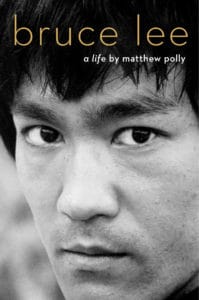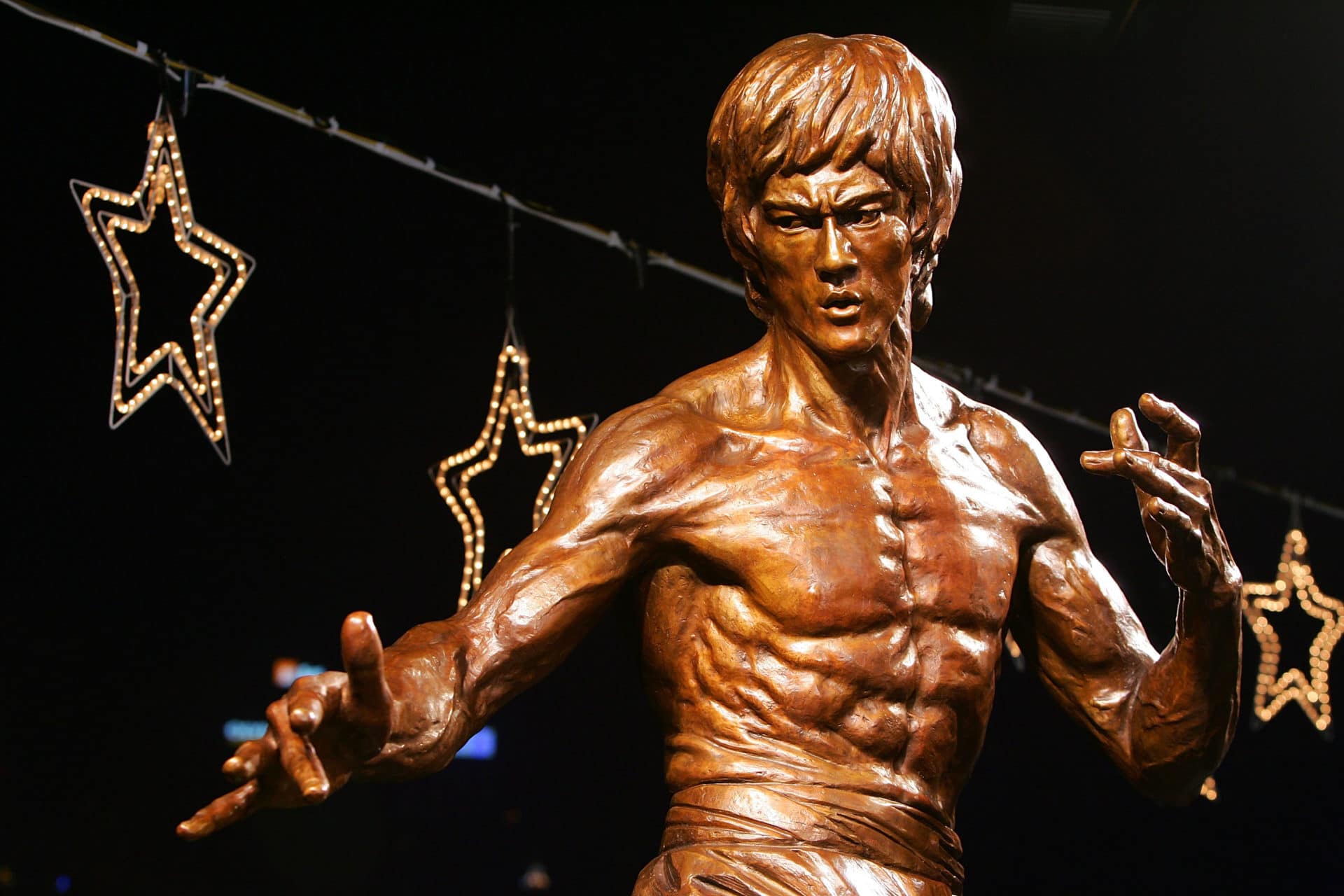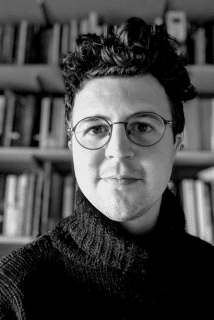Bruce Lee: A Deeper Look at the Legend
Culture
An interview with the writer of a new biography exploring the actor and spiritual adventurer who popularised martial arts in the West and became an icon.
Bruce Lee became a worldwide phenomenon a month after his death on July 20, 1973. His last film and biggest box office hit, Enter the Dragon, was released internationally less than four weeks after he died in Hong Kong at the age of 32. In those three decades, Lee accomplished more than most do in much longer life spans. He popularized kung fu in the West; created his own style that eventually led to the birth of mixed martial arts; and took action flick fight scenes from clumpy brawls to fluid fight sequences. Most of all, Lee inspired generations of young men and women who took up kung fu and gained not only physical skills but mental strength.
Author Matthew Polly was one of those inspired as a child by Lee. In his early 20s, Polly, now 47, took a leave of absence from Princeton University to study kung fu with Shaolin monks in Henan, China. He recounted that experience in American Shaolin. A few years later, he delved into the world of MMA in Tapped Out. Polly followed up those books with the release of Bruce Lee: A Life, a definitive biography of the actor. Polly worked on the book for six years, interviewing more than 100 people who knew Lee. The minutely researched tome is a mesmerizing portrait of Lee, which conveys the very human side of a man whose reputation seems almost superhuman.
The Book of Man spoke to Polly about Lee’s formidable kung fu skills, the spiritual philosophies that became the backbone of his success and Polly’s theory about what really killed Lee.
Why did you want to write about Bruce Lee?
Bruce Lee was my childhood hero. I saw Enter the Dragon when I was a skinny, bullied 12-year-old and he jumped off the screen into my imagination. And it inspired me to take up the martial arts. I went to China to a Shaolin temple to study kung fu. Bruce Lee changed my life for the better.
Why is Bruce Lee still relevant today?
I think Bruce Lee is an inspiration for millions of people who took up the martial arts and found a deeper spiritual awareness and also an inner strength through that. He was more than just a movie star. He was also a missionary who introduced more people to Taoism and Eastern philosophy than probably anybody else that ever lived. For that cultural impact I think Bruce Lee still has a place.
How do you think he’s still remembered? Does he get proper credit for introducing the Western world to Eastern philosophies?
I don’t think he does. The Chinese have a saying, “When you drink the water, remember who dug the well”. And Bruce built the well and I think people have forgotten in a certain way that it was him who inspired this movement. So I wanted to write the first authoritative biography of Bruce Lee to remind people of that.
Do you think he doesn’t get his proper due because he was this good-looking, glamorous figure with almost magical powers of kung fu? The stereotype is that someone that physically spectacular and can’t also be spiritual.
That’s right. I think there are a few things that happened. One, the kung fu movies that followed Bruce Lee’s were pretty schlocky. So kung fu movies got a reputation as being lowbrow, a step above porn and one below horror. And it tainted everything associated with Bruce in that sense. I think there’s another fact, which is that East Asian males are ignored in Western culture. Except for Bruce, and then it took 25 years for Jackie Chan to become a star, there aren’t very many, if any, leading Asian male characters in our culture. And you touched on something important, the third thing, which is Bruce did have a glamorous life. He was a movie star, he was very good-looking and on film he seemed invincible and so not that many people except his real fans understand the aspect of his life, which was the spiritual journey he was on.
What do you think are some of the biggest misconceptions about him?
Certainly that he was invincible. He nearly died of cholera when he was a baby. When he was growing up, he couldn’t walk properly until he was four. He was skinny and scrawny. One leg was shorter than the other. He was near-sighted. He was not someone who you would think would be considered when he got older the deadliest man on earth. You wouldn’t have predicted that. And he struggled intensely when he got to Hollywood in his quest to become the first Chinese-American male to ever star in a Hollywood movie. What I tried to describe in the book was just how much he faced and how hard it was for him to do it. And capture the sense of the indomitable will that made him who he was. He wasn’t naturally a great fighter. He was quick and he could pick up movements but [it was] through sheer effort that he made himself who he was.
How many hours a day did he workout?
He did about four. On some days, it would be two. But yeah he would train about four, five hours a day… He is the sort of patron saint to that work out, work harder and find yourself [ethos]. What I think is interesting about him is his library had 2,500 books. He was deeply into philosophy. He would annotate books by [René] Descartes and [David] Hume as well as Lao Tzu, Chuang Tzu and he talked about philosophy all the time to the point where some of his friends would tune him out [laughs].
It seems he became calmer and more focused after he started following the philosophy behind kung fu, Taoism.
I think when he was younger this was a way of dealing with his own psychological needs. It’s like, “Physician, heal thyself”. He was a fire element by all accounts. He had a short temper, he was hyperactive—his nickname was Never Sit Still. So “Be water, my friend” [Lee’s famous quote] was almost a way for him to balance out the other half of himself. He married a woman who was very much a water, calming influence. I think Bruce when he was speaking to other people he was also speaking to himself.
What were you most surprised to learn about him?
One, that he was a terrible driver [laughs]. You think of him as being somewhat perfect, right? From the movies you’ve seen, he never misses a kick. But people would say, “God, he scared me when I drove with him”. Yet he never got into a major accident. And the other one was, what I really wanted to do was put Bruce Lee in the context of the era he lived in because I think his image floats in the air unmoored from any place and time. One aspect that really struck me was the degree in which he was an actor in 1960s Hollywood and he became a bit of a hippie. He was into the self-help movement; he smoked a little pot; he hung out with Steve McQueen. He really had a way of adapting to whatever culture he was in. He bounced around from Hong Kong to Hollywood and he had to live in very different places and fit in in different times.
Do you think America also helped bring out the best in him because the culture at the time inspired him to read self-help books and explore philosophies outside of China and the East?
Yes, I think that’s what his great contribution is: He was the first person to bridge the two cultures in such a major way and become such a star and such an influencer. He had an American sense of individualism. His philosophy was really an attack against living under tradition and accepting what you were taught and having to live it. He had an anti-establishment view of authority. That was very much American 1960s youth culture. But at the same time he had this long Chinese tradition so he didn’t reject tradition fully but he thought you should question it.
What can people learn from his commitment to his craft?
Bruce Lee believed that becoming great in the thing that you do was a way to spiritually advance. His art form was his religion. And martial arts was his way of getting in touch with himself. That I think is a crucial lesson. The second thing that really impressed me was realizing when you’re a kid they say you can be anything that you want to be and you get older and realize that’s not true [laughs]. But Bruce Lee proves that every once in a while it can be true. He set out with an impossible dream to conquer Hollywood and even his closest friends like [screenwriter and producer] Stirling Silliphant said to him, “Bruce it’s never going to happen. You’re an Asian guy in a white man’s world”. And he proved everyone wrong.
He was almost always optimistic in the face of setbacks. What can people learn from that outlook?
I think you’re more likely to gain success if you believe you can than if you already start off pessimistic. Bruce Lee’s view was the world around him was already pessimistic enough and it was his job to bend it to his will. When his project The Silent Flute was going down in flames he was still telling people “it’s going to turn around” [laughs]. And I was reading it going like, “Is he delusional?” But that was his way. It was always like, “This is going to work out. Don’t worry, we’re going to do this.” And then a couple of years later, he turned out to be right. The project arrived. I’ve always believed that the universe is flexible and if you want something badly enough you can bend it a little bit to your will. And Bruce exemplifies that.
Bruce was a troubled youth who like many troubled young men turned to violence to feel validated and confident. What would Bruce say to troubled young men today?
It’s very crucial to point out that his fiery temper got him into a lot of trouble. He was essentially banished from Hong Kong because the police were going to arrest him if he didn’t stop fighting and he couldn’t stop fighting. And so his parents had to send him away. I think he really felt that the martial arts was a way to contain that kind of violence and rage. I’ve often joked that kung fu is China’s version of Ritalin. It’s a way to take hyperactive boys and give them a framework in discipline. Not tell them that they can’t do anything aggressive but they have to do it within this context. Like within this room, under consent, with supervision, you can let out these feelings and emotions and aggression. You can see as Bruce gets older he doesn’t ever quite master this unbelievable temper that he has but it gets better over time. I think that’s what he would say to the youth: “If you stick with the discipline this aggression will be contained and can be controlled and you can make something of your life”. He would tell friends, “If I had stayed in Hong Kong and hadn’t made a change, I would’ve ended up dead or in jail”.
I think if he was living today he would’ve morphed into some sort of self-development guru.
I think that’s absolutely true [laughs]. I joked once that he would’ve been on Oprah a lot [laughs]. And he would’ve been all over Twitter. He liked short aphorisms and he very much thought of himself as a writer. He did one small book and he never quite got a second book finished in time. But I’m certain he’d have written books like Zen and My Personal Development and then he would’ve gone on all the talk shows talking about this. I think given his troubled youth he would’ve been involved in those types of charities as he got older and more established.
How important was he to the history of kung fu, both the art itself and its practice around the world?
He’s a crucial figure in both. The sport of mixed martial arts, the cage fighting, Conor McGregor, that never would’ve happened if he hadn’t created the martial arts craze in the early 1970s. Before him there were like a handful of schools, particularly in England. And then after him there were over 20 million martial arts students in the U.S. In England there were millions more. Also his philosophy of taking what works and discarding what doesn’t became what mixed martial arts is, which is we’re going to figure out which things work for us and we’re going to test it in the cage and then discard this and take that and be very practical. Prior to Bruce, it was, “my master taught me this, and his master taught him that” so it was very conservative. That philosophical change of approach is almost totally billed to Bruce Lee. He put the mixed in the mixed martial arts. And then almost no one knew the word kung fu. So he was the popularizer who brought it to the West and made it part of it and he also created in Western culture the kung fu master. So you can’t have Jackie Chan or Jet Li without Bruce Lee. And the way I thought about it was if you watch movies from the 1960s there’s some big barrel-chested white guy who punches this long haymaker punch and that’s the whole fight scene. After Bruce Lee every scene the guys are kicking and they’re punching and they’re throwing elbows. He put martial arts into the center of Western culture and changed the way we thought about moviemaking and action movies particularly.
What’s the main takeaway you’d like readers to learn from his life?
I think the most important lesson is that Bruce Lee was a troubled youth. He said himself my elders disapproved of me. And yet he was able to take that rebellious energy that he had and push it into a context that allowed him to succeed. His brother became a brilliant scientist but he was the person who did what he was supposed to do. And you had to be a rebel to think that you could be the first Chinese-American to star in a Hollywood movie. So the things that his elders thought were flaws as a teenager is what allowed him to succeed. He just needed to find a way to channel that energy. I think for young men who are troubled that he’s an inspiration because if you can find the right avenue for that rebellious energy you can create something amazing.
What can older men take from him?
I think Bruce’s view that continual practice of an art, whichever art that is, is a way to find your way spiritual center. For him that was the marital arts, for someone else it could be gardening or archery. It doesn’t matter what it is. But he took that from the Zen tradition, this idea that becoming a master at a particular activity is a way to find peace and calm. That’s something that I’ve certainly felt with my life.
There was a lot of controversy around how he passed away. Can you touch on that?
Sure, so he died in another woman’s bed and they tried to cover that up to protect the family, protect his reputation and also protect the movie, Enter the Dragon that he had coming out. When the press discovered the deception it turned into a ripe scandal and the Hong Kong press was very much like the British tabloids are now. They went wild. People started speculating on what might have killed him and the problem was the experts couldn’t agree on what might have caused his death. When there was no expert agreement then anything goes, right? And for years it was like it was ninjas, it was the kung fu death touch. They had a coroner’s inquest and their conclusion was it was an allergic reaction to aspirin but there were no symptoms of that. It seems like they pulled that out of thin air. I spent a lot of time talking to medical experts trying to suss out what was the most likely scenario. There’s no way to know for certain and my conclusion is I think it was heat stroke. [The day he died] was the hottest day of the summer. He had lost weight and wasn’t sleeping, which both increase the likelihood. The final data point that I was like, “Why hadn’t no one thought about this before?” was he had the sweat glands under his armpits surgically removed about two months before. He was on screen sweating everywhere and he got sick of being toweled off between every take.
You mentioned he was found in another woman’s bed. That is one thing that doesn’t make sense. He claimed to be so spiritual and he wouldn’t accept kung fu students unless he thought they were of an upstanding moral character. And yet he was often cheating on Linda.
And this is why this part of his story always gets written out. Because people can’t make sense of it and so when you read every other Bruce Lee book they just delete this section as if it didn’t happen. Even if it doesn’t make sense it has to be part of the story. And I was surprised when I was interviewing some of these women. The thing that struck me and was hard for me to get my head around because I grew up in a very conservative Catholic family in the Midwest is that he grew up in a culture that did not believe in monogamy. His grandfather had 13 concubines, his father had his half-sister out of wedlock with another woman. And then he got to Hollywood in the Swinging ’60s and everybody…. he has a line that I put in the book where people ask him about bad behavior in Hollywood and he said, “Look I’m not as bad as some of them, but I’m not saying I’m a saint either”. So he knew he wasn’t living up to the highest standards, but it was very much of that time. That was hard for me to accept but I had to finally realize… he loved his wife, he didn’t want to hurt her feelings so he kept it quiet. But he didn’t view what he was doing as morally wrong.
Actress Sharon Farel, whom he had an affair with, said he was the best lover she had. I wonder if that had to do with his kung fu skills, if it translated in the bedroom too?
She said that because he was a dancer and he just knew how to move. I was blushing during that interview [laughs]. I was like, “oh, he’s the best lover you ever had… you know this recorder is on?” But yes, I do think he had a great sense of timing and rhythm and physicality because of his dancing and his martial arts and he was very connected to mind, body, spirit.
What one Bruce Lee movie would you recommend everyone watch?
Well the easy answer to that is Enter the Dragon, but I won’t recommend that because everyone has either watched it or they don’t care about Bruce Lee [laughs]. The movie I think is interesting to watch is The Orphan that he made in 1960. He was a child actor, which many people don’t know. This was the last of 20 Cantonese films that he made. He modeled it after James Dean’s Rebel Without a Cause. It’s the most interesting, complex acting performance he gave in his career. And it gives you a sense of another part of his personality. Because we only think of him as the kung fu star, to see him play a troubled youth in a drama gives you a sense of his range.

Trending

Join The Book of Man
Sign up to our daily newsletters to join the frontline of the revolution in masculinity.

















